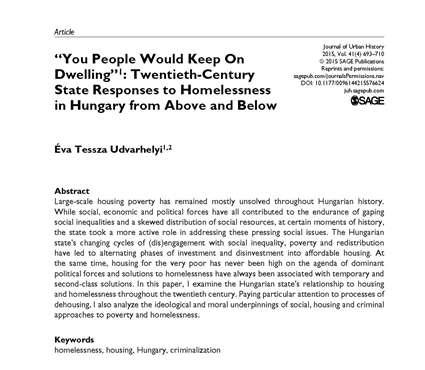Journal of Urban History: "You people would keep on dwelling"
2015.06.12. 09:58
Éva Tessza Udvarhelyi: “You People Would Keep On Dwelling”: Twentieth-Century State Responses to Homelessness in Hungary from Above and Below
Large-scale housing poverty has remained mostly unsolved throughout Hungarian history. While social, economic and political forces have all contributed to the endurance of gaping social inequalities and a skewed distribution of social resources, at certain moments of history, the state took a more active role in addressing these pressing social issues. The Hungarian state’s changing cycles of (dis)engagement with social inequality, poverty and redistribution have led to alternating phases of investment and disinvestment into affordable housing. At the same time, housing for the very poor has never been high on the agenda of dominant political forces and solutions to homelessness have always been associated with temporary and second-class solutions. In this paper, I examine the Hungarian state’s relationship to housing and homelessness throughout the twentieth century. Paying particular attention to processes of dehousing, I also analyze the ideological and moral underpinnings of social, housing and criminal approaches to poverty and homelessness.

The article can be accessed here.






